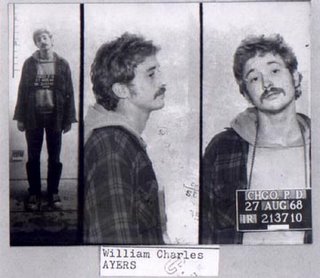

Bill Ayers: Pictured then and now.
On September 11, 2001, a valentine to Bill Ayers and his wife Bernardine Dohrn was written by the New York Times.
From The Weekly Standard in October of that year.
POOR BILL AYERS. His timing could not have been worse. Just when his widely publicized memoir of his days as a terrorist was coming out, our nation suffered its worst terrorist assault ever.
Indeed, the very morning of the attack, the New York Times printed a fawning profile of Ayers and his comrade in terror, Bernardine Dohrn. Under the headline "No Regrets for a Love of Explosives," accompanied by a large color photo of the couple, Ayers boasts that he bombed New York City’s police headquarters in 1970, the Capitol building in 1971, and the Pentagon in 1972—and proudly adds, "I don’t regret setting bombs. I feel we didn’t do enough." Asked whether he would do it again, he answers, "I don’t want to discount the possibility." Or, as he puts it in Fugitive Days: A Memoir, "I can’t imagine entirely dismissing the possibility."
And this man is now a tenured professor at the sister school of my alma mater. Of course, with his past, Bill Ayers would have trouble passing a background check to work as a cashier at Home Depot.
Here is Professor Ayers' University of Illinois-Chicago homepage. Below is his biography from that page:
William Ayers is a school reform activist, Distinguished Professor of Education, and Senior University Scholar at the University of Illinois at Chicago where he teaches courses in interpretive research, urban school change, and youth and the modern predicament. He is the founder of the Center for Youth and Society and founder and co-director of the Small Schools Workshop.
A graduate of the Bank Street College of Education and Teachers College, Columbia University, he has written extensively about social justice, democracy and education. His interests focus on the political and cultural contexts of schooling as well as the meaning and ethical purposes of teachers, students, and families. His articles have appeared in many journals including the Harvard Educational Review, the Journal of Teacher Education, Teachers College Record, The Nation, and The Cambridge Journal of Education. His books include A Kind and Just Parent: The Children of Juvenile Court (Beacon Press, 1997), The Good Preschool Teacher, (Teachers College Press, 1989), and To Teach: The Journey of a Teacher, (Teachers College Press, 1993) which was named Book of the Year in 1993 by Kappa Delta Pi and won the Witten Award for Distinguished Work in Biography and Autobiography in 1995. Recent edited books include To Become a Teacher: Making a Difference in Children's Lives, (Teachers College Press, 1995), (with Janet Miller) A Light in Dark Times: Maxine Greene and the Unfinished Conversation, (Teachers College Press, 1997), (with Pat Ford) City Kids/City Teachers: Reports from the Front Row, (The New Press, 1996), (with Jean Ann Hunt and Therese Quinn) Teaching for Social Justice: A Democracy and Education Reader, (The New Press and Teachers College Press, 1998), (with Mike Klonsky and Gabrielle Lyon) A Simple Justice: The Challenge of Small Schools, (Teachers College Press, 2000), and (with Rick Ayers and Bernardine Dohrn) Zero Tolerance: Resisting the Drive for Punishment. A handbook for parents, students, educators and citizens, (The New Press, 2001). His latest book is Fugitive Days: A Memoir, (Beacon Press, 2001).
The only hint of his illustrious past is a mention of his Fugitive Days book.
Technorti tags: Bill Ayers UIC 9/11 Terrorist Academia
No comments:
Post a Comment